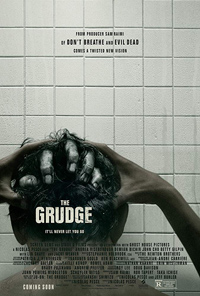Curse Strings: Pesce Reawakens J-horror Cornerstone with Studio Reboot
 Director Nicolas Pesce becomes the first Borderline Film alum to enter studio filmmaking with his reboot of The Grudge, a seminal entry from the J-horror craze of the mid-2000s, a period littered with glossy American remakes of genre films from Hideo Nikata, Kiyoshi Kurosawa, and of course, Takashi Shimizu. While more recent attempts to resurrect these franchises haven’t been successful (2017’s Rings, for instance), Pesce seems an inspired choice for the inevitable attempt for this Sony Pictures property, which saw its last entry, The Grudge 3 dispel its nasty spirit back in 2009.
Director Nicolas Pesce becomes the first Borderline Film alum to enter studio filmmaking with his reboot of The Grudge, a seminal entry from the J-horror craze of the mid-2000s, a period littered with glossy American remakes of genre films from Hideo Nikata, Kiyoshi Kurosawa, and of course, Takashi Shimizu. While more recent attempts to resurrect these franchises haven’t been successful (2017’s Rings, for instance), Pesce seems an inspired choice for the inevitable attempt for this Sony Pictures property, which saw its last entry, The Grudge 3 dispel its nasty spirit back in 2009.
With a flair for Cronenbergian body horror and Lynchian weirdness as evidenced in his 2016 debut The Eyes of My Mother (review), Pesce is one of the few directors to successfully mount a Murakami adaptation with his 2018 sophomore film Piercing (although this comes nowhere near the author’s most notorious cinematic spectacle, Takashi Miike 1999 Audition in 1999).
With a formidable cast of seasoned character actors in tow, Pesce mounts a moody homage to Shimizu, a director who remade his own 2002 hit for US audiences with the 2004 Sarah Michelle Gellar starrer (and the 2006 sequel). But for all its genre appropriate flourishes and gory craftsmanship which defies the theatrical release date in which its studio abandoned it, Pesce has little wiggle room to revitalize a familiar story which became a derivative template for countless films in the wake of Shimizu and Gore Verbinski’s The Ring (2002) remake.
As far as its narrative structure goes, Pesce manages to interweave four narrative subplots compounded into one with logical finesse. Opening in 2004 Tokyo, where the ‘curse’ is first contracted by an unassuming American woman (Tara Westwood), the plot quickly lurches forward to Anywhere USA 2006 (which is actually Manitoba), where the weary Detective Muldoon (Andrea Riseborough), a single mother, returns to work following the death of her husband. Along with her new partner, Goodman (Demian Bichir), she’s immediately thrown into an investigation upon the grisly discover of the rotted corpse of Linda Moody (Jackie Weaver), a woman who worked as a euthanasia assistant. Moody was connected to a particular house where a previous murder had happened, the investigation of which drove Goodman’s previous partner (William Sadler) insane. Muldoon takes it upon herself to enter said home, where she finds a cuckoo woman (Lin Shaye) with gnawed off fingers, starving to death while her husband’s corpse (Frankie Faison) decomposes nearby. Muldoon works to put together the pieces and finds the strange presence and its eerie clicking noises now following her caused the deaths of several families, including the realtor (John Cho) and his pregnant wife (Betty Gilpin) who had attempted to sell the house two years prior.
Pesce reunites with his Piercing DP Zack Galler to create an appropriately menacing mise en scene, all brooding and bruised nighttime terrors awash with plenty of jaundiced, sickly tones to convey the diseased spiritual world these characters are unwittingly stumbling into.
Paired with a subtle score from The Newton Brothers and production design from Jean-Andre Carriere (who worked on Noe’s Enter the Void, Pascal Laugier’s Martyrs and recently JT LeRoy) and The Grudge looks and sounds a lot better than one expects from the usual horror titles dumped into cinemas the first weekend of the year (the theatrical release was pushed back twice in 2019).
Riseborough, who is always watchable, elevates the familiar beats of her character’s Sisyphean trajectory, but is not allowed much time to become a conduit for the audience’s interest or empathy, which may be due to the sheer amount of entangled plot components. Likewise, an extension of the Bichir and Sadler subplot could have spruced up the unease, since nothing much happens one doesn’t already see coming five steps ahead (sans a finale which might suggest a sequel but something not wholly dependent on what’s come before).
Familiar faces like Weaver, Faison and Cho are victim to the same emotional estrangement, even though each of them is mired in unquestionably tragic moral dilemmas. But then, at least there’s Lin Shaye to unleash some zesty histrionics, including a denouement, which although not quite realistic, will remain lodged in the mind’s eye.
★★½/☆☆☆☆☆


